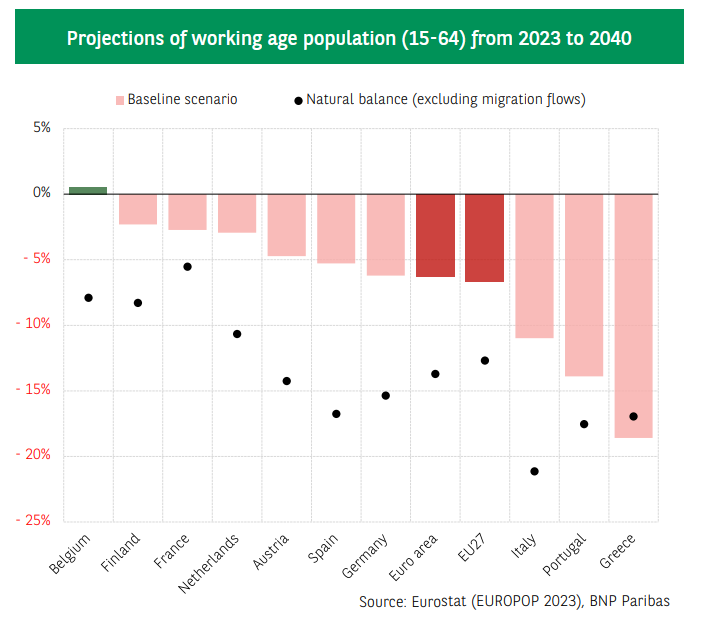![BNP Paribas: The unenviable first Greek bank in the aging European Union [γράφημα] – Financial postman BNP Paribas: The unenviable first Greek bank in the aging European Union [γράφημα] – Financial postman](https://www.ot.gr/wp-content/uploads/2023/11/dimosio-ergazomeni-800x533-1-1024x682-1.jpg)
BNP Paribas highlighted a sad first step for Greece in the EU: the rapid decline in the working-age population, which will make green transition efforts more difficult, as it will in many countries.
The “bet” of the green transition, as he explains, requires specializations that many countries do not have enough of, leading to a series of regulations that are unfavorable for many workers, most notably the increase in retirement limits.
Gallup: The astronomical amount that unhappy employees cost a company

Investments in the “work” factor.
As BNP Paribas explains, to achieve its climate goals, the EU will have to cut greenhouse gas emissions by 90% by 2040 (compared to 1990 levels), according to a recent recommendation from the European Commission. This means a rapid increase in investment in renewable energy sources, electricity grids, transportation infrastructure, and thermal renovation of buildings.
But to achieve this goal, a large financial burden must be borne (estimated at between 58 and 66 billion euros annually in France), as well as an increased search for technological and human resources. For its environmental transformation, Geria Epirus is looking for IT scientists, civil engineers, mechanical engineers, construction and public works managers, plasterers, electricians, masons and others.
Likewise, because it requires reducing phytosanitary inputs, expanding organic growing areas, and restoring plants, green farming practices as defined by the “farm to fork” strategy involve more mechanical and manual labor, and therefore more labor.
Demographic difficulties
The above, according to BNP Paribas, leads us to a question that has been discussed since the beginning of economic thought, which is the supply of available labor and its adequacy for needs. In this regard, Eurostat's recently updated demographic projections show that such projections are rare.
With the combined effect of longer life expectancy and lower birth rates, Europe's working-age population (ages 15-64) is expected to decline sharply between now and 2040 (by about 7%, or 19 million people in Eurostat's baseline scenario). While the number of elderly people (65 years and over) is expected to increase (by 26 million people).
To compensate for this phenomenon, most EU countries have long pursued policies aimed at maximizing employment rates (by raising the retirement age, tightening unemployment benefit rules, encouraging youth employment, promoting vocational training, etc.).
They also resort to immigration, without which the decline of Europe's working-age population would be twice as rapid, and the enormous task of greening the economy would become more complex.

“Avid problem solver. Extreme social media junkie. Beer buff. Coffee guru. Internet geek. Travel ninja.”





More Stories
“Recycling – Changing the water heater”: the possibility of paying the financing to the institution once or partially
Libya: US General Meets Haftar Amid Tensions Between Governments
New tax exemption package and incentives for business and corporate mergers..